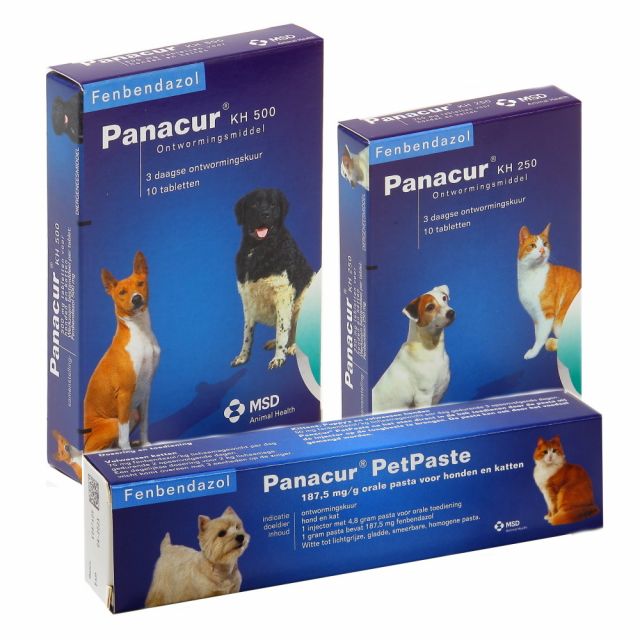Giardia in dogs
Giardia is a common intestinal parasite, particularly in young dogs. If dogs ingest the parasite's eggs (cysts) through contaminated food, water, or feces, they can become infected with Giardia. Infection can also occur through close contact with other infected dogs. Once in the dog's body, the Giardia parasite attaches to the intestinal wall and multiplies rapidly, which can lead to various health problems. Interestingly, a Giardia infection does not always lead to diarrhea; in a study of healthy dogs with normal stools, Giardia was found in as many as 15% of the dogs' feces! Approximately 25% of the dogs with diarrhea tested positive for Giardia. Giardia is relatively common, especially in puppies, and can be a rather persistent infection.
Giardia can also occur in humans and cause problems. Although this is quite rare, it is therefore very important to take hygienic measures if your dog has Giardia.
Symptoms of Giardia in Dogs
Sometimes you may not notice an infection with Giardia, but in other cases, your dog may become ill from this single-celled parasite. The incubation period, the time between ingestion of the cysts and the onset of symptoms, ranges from 5 to 16 days. The most common symptoms are:
- Diarrhea: the stool is thinner, often greasy or slimy, and usually smells strong. Sometimes you may notice that your dog needs to defecate more often or has trouble holding it in. The stool can be remarkably light in color. The diarrhea can occur intermittently (your dog may sometimes have diarrhea and sometimes normal stool). Of course, there are multiple causes for diarrhea in your dog.
- Abdominal pain.
- Poor eating.
- Vomiting: usually, we see only diarrhea, but sometimes Giardia can also cause vomiting.
- Weight loss: if the problems persist, your dog can lose weight due to reduced nutrient absorption by the intestine and lack of appetite.
Diagnosing Giardia in Dogs
If your dog has diarrhea and there is a suspicion that Giardia might be involved, it is important to consult a veterinarian for a proper diagnosis. The veterinarian will examine your dog's feces for the presence of Giardia cysts or the parasite itself. Since Giardia is not excreted in every stool, it is usually advised to perform a test on a mixed sample over three days.
Treatment of Giardia in Dogs
The treatment of Giardia in dogs typically involves a combination of medication and advice on hygienic measures.
Medication
Usually, Panacur, a deworming agent containing Fenbendazole which is also effective against Giardia, is recommended. In some cases, an antibiotic may be chosen.
The medication is generally prescribed for three to five days, and it is important to complete the course, even if the symptoms disappear during the treatment.
Hygiene
The Giardia parasite tends to remain in the environment for a long time. If your dog continuously drinks from the same puddle or ditch outdoors or comes into contact with the feces of infected dogs in a walking area (or licks grass where feces have been), the chance of the infection returning or not resolving is very high. It's wise to clean your dog's hindquarters and paws daily to prevent the cysts from settling in its fur or bringing cysts indoors on its paws. This extra measure is especially important for recurring infections. Washing the dog's bed, blankets, and carpets is also part of combating the Giardia parasite.
Diet
If your dog has diarrhea due to Giardia, it may be useful to provide easily digestible food such as Sanimed Intestinal Dog to support the intestines. Probiotics can also help restore balance in the intestines more quickly.
What if Giardia Doesn't Go Away?
An infection with Giardia can be quite frustrating. Sometimes your dog continues to have symptoms and tests positive. Usually, this is due to repeated infections from something in the dog's environment. A different walking routine (on a leash, a different route, not allowing eating from the street) is essential. There may also be other animals (or people!) within the household that excrete the parasite without showing symptoms. In cases of re-infection, thorough cleaning and disinfection of the environment with special agents are very important, as is the preventive treatment of other pets in the house.
In cases of persistent diarrhea with the presence of Giardia in the feces, there is often an underlying condition that weakens the local intestinal defense. Consider, for example, food sensitivities, a vitamin deficiency, or a weakened immune system. It is advisable to investigate and treat this underlying cause.
Also, for dogs with chronic complaints, easily digestible food supports the recovery of the intestinal cells.
If you suspect that your dog has Giardia, visit your veterinarian for a proper diagnosis and treatment. Strictly administer the prescribed medication and maintain good hygiene to prevent re-infection. With the right care and treatment, your dog can recover well from Giardia and enjoy a healthy and happy life.
If you have a question about our products or about Giardia in your dog, please contact us.

